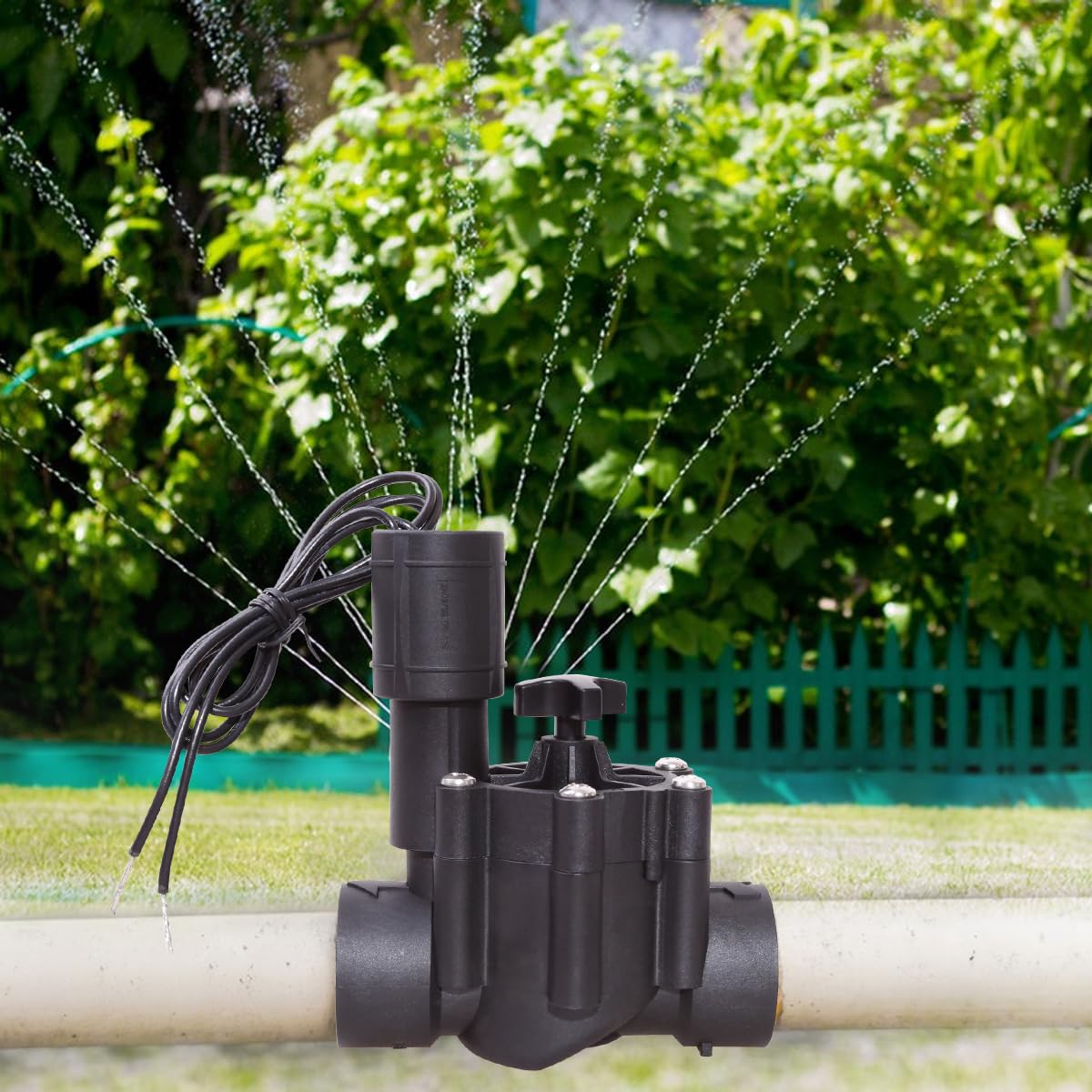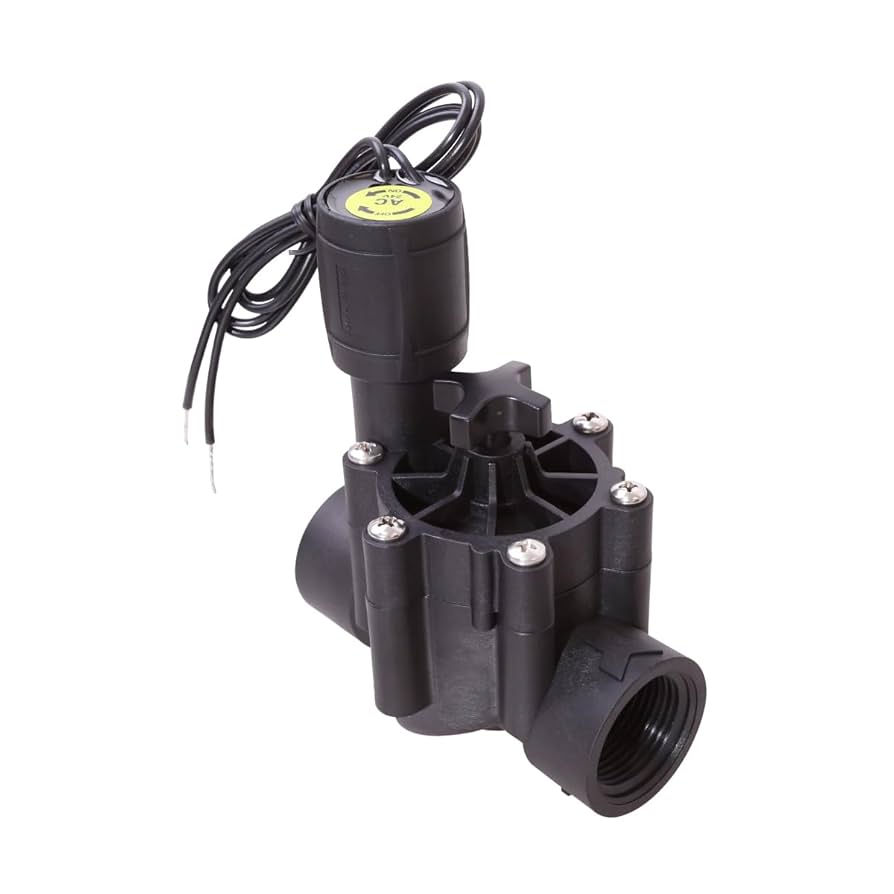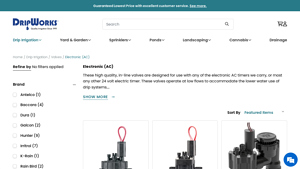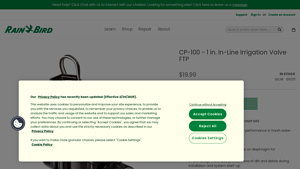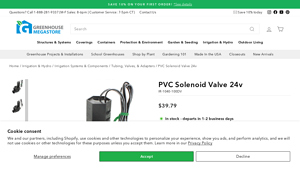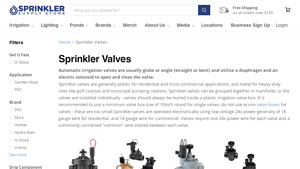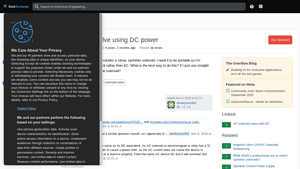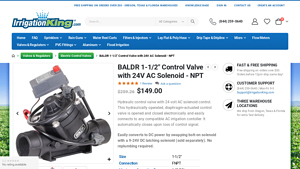Introduction: Navigating the Global Market for 24v irrigation valve
In today’s competitive landscape, sourcing reliable 24v irrigation valves can pose a significant challenge for international B2B buyers. As agricultural and landscaping demands evolve, companies must navigate a complex array of suppliers, technologies, and regional regulations. This guide offers a comprehensive overview of the 24v irrigation valve market, addressing various valve types, their applications, and critical considerations for supplier vetting. By delving into cost factors, performance metrics, and compatibility with existing irrigation systems, we aim to equip decision-makers with the knowledge needed to make informed purchasing choices.
This resource is particularly tailored for buyers in diverse regions, including Africa, South America, the Middle East, and Europe, such as Saudi Arabia and Nigeria. Understanding the unique challenges and opportunities in these markets is crucial for optimizing irrigation solutions that meet specific local needs. By exploring best practices for sourcing and integrating 24v irrigation valves, this guide empowers businesses to enhance their operational efficiency while ensuring sustainable water management practices.
As you navigate this essential guide, you’ll discover actionable insights that will not only streamline your procurement process but also foster long-term partnerships with reputable suppliers, ultimately driving growth and innovation in your irrigation projects.
Understanding 24v irrigation valve Types and Variations
| Type Name | Key Distinguishing Features | Primary B2B Applications | Brief Pros & Cons for Buyers |
|---|---|---|---|
| In-Line Valves | Compact design; minimizes pressure loss; suitable for low flow | Commercial irrigation systems, landscaping | Pros: Space-saving; efficient operation. Cons: Installation may require specific fittings. |
| PVC Solenoid Valves | Durable PVC construction; available in various sizes | Agricultural irrigation, greenhouse systems | Pros: Resistant to corrosion; versatile sizing. Cons: Limited to certain flow rates. |
| Electronic Solenoids | Operate on low power; compatible with various timers | Automated irrigation systems | Pros: Energy-efficient; reliable performance. Cons: May require professional installation. |
| Low Flow Valves | Designed for drip irrigation; handles low water volumes | Residential gardens, small commercial setups | Pros: Water-efficient; ideal for delicate plants. Cons: May clog if not maintained properly. |
| Reverse Flow Valves | Prevents flooding; designed to handle high pressure | Large-scale agricultural operations | Pros: Reduces water wastage; enhances system reliability. Cons: Higher initial cost. |
What Are the Characteristics of In-Line Valves?
In-line valves are engineered for seamless integration into irrigation systems, featuring a compact design that minimizes pressure loss. They are ideal for commercial irrigation and landscaping applications where space is limited. When purchasing, buyers should consider compatibility with existing systems and the specific fittings required for installation, ensuring that the in-line valve can be easily integrated without extensive modifications.
How Do PVC Solenoid Valves Stand Out?
PVC solenoid valves are known for their durability and resistance to corrosion, making them a preferred choice for agricultural and greenhouse irrigation systems. Available in various sizes, these valves can handle different flow rates efficiently. Buyers should assess the specific requirements of their irrigation setup, including the desired flow rate and compatibility with other components, to ensure optimal performance and longevity.
What Benefits Do Electronic Solenoids Offer?
Electronic solenoids operate on low power, making them compatible with a wide range of timers and controllers. This feature is particularly advantageous for automated irrigation systems that require consistent and reliable operation. When considering electronic solenoids, businesses should evaluate energy efficiency, reliability, and whether professional installation is necessary, as this can impact overall project costs.
Why Choose Low Flow Valves for Specific Applications?
Low flow valves are specifically designed for drip irrigation systems, efficiently managing low water volumes. This makes them suitable for residential gardens and small commercial setups, where water conservation is a priority. Buyers should consider the maintenance needs of these valves, as they can be prone to clogging if not properly cared for, which could affect system performance.
What Are the Advantages of Reverse Flow Valves?
Reverse flow valves are designed to prevent flooding and are particularly effective in high-pressure environments, making them ideal for large-scale agricultural operations. Their construction helps to reduce water wastage and enhances system reliability, which is crucial for extensive irrigation setups. When purchasing, buyers should weigh the higher initial costs against the long-term savings in water usage and system efficiency.
Key Industrial Applications of 24v irrigation valve
| Industry/Sector | Specific Application of 24v irrigation valve | Value/Benefit for the Business | Key Sourcing Considerations for this Application |
|---|---|---|---|
| Agriculture | Automated irrigation systems for crop production | Enhances water efficiency, reduces labor costs, and increases yield | Compatibility with local power standards and water sources |
| Landscaping | Residential and commercial landscape irrigation | Ensures consistent watering, promotes healthy plant growth | Durability against harsh environmental conditions |
| Golf Courses | Precision watering for greens and fairways | Maintains optimal playing conditions and turf health | Ability to integrate with existing irrigation controllers |
| Greenhouses | Automated misting and irrigation for plant cultivation | Optimizes plant health and growth rates, reduces water wastage | Sizing and compatibility with greenhouse setups |
| Horticulture | Irrigation for nurseries and plant propagation | Supports healthy plant development and reduces resource consumption | Specific flow rates and voltage compatibility |
How Are 24v Irrigation Valves Used in Agriculture?
In the agricultural sector, 24v irrigation valves are integral to automated irrigation systems that enhance water efficiency and crop yield. These valves control water flow to different sections of farmland, allowing for precise watering schedules tailored to crop needs. International buyers, especially from regions like Africa and South America, must consider compatibility with local power sources and ensure the valves can handle varying water quality.
What Role Do 24v Irrigation Valves Play in Landscaping?
For landscaping applications, 24v irrigation valves are essential for both residential and commercial projects, providing reliable and automated watering solutions. This ensures that plants receive consistent moisture, promoting growth while minimizing labor costs. Buyers in regions with extreme weather conditions, such as the Middle East, should prioritize valves that are durable and resistant to environmental stressors.
How Are 24v Irrigation Valves Utilized in Golf Courses?
Golf courses use 24v irrigation valves to maintain the health of greens and fairways through precision watering. These valves help regulate water distribution, ensuring optimal turf conditions for play. Golf course managers need to source valves that can integrate seamlessly with existing irrigation controllers, taking into account the specific requirements of the course layout and local climate.
Why Are 24v Irrigation Valves Important for Greenhouses?
In greenhouse operations, 24v irrigation valves facilitate automated misting and irrigation systems that are crucial for plant cultivation. By optimizing water usage and ensuring consistent moisture levels, these valves contribute to healthier plant growth and reduced water wastage. Buyers must assess the sizing and compatibility of these valves with their greenhouse setups to ensure efficient operations.
What Benefits Do 24v Irrigation Valves Offer to Horticulture?
In horticulture, 24v irrigation valves are used to manage irrigation systems in nurseries and plant propagation environments. These valves support healthy plant development by providing precise watering that meets the specific needs of various plant species. When sourcing for horticultural applications, it’s essential to consider the required flow rates and ensure that the valves are compatible with existing irrigation infrastructure to maximize efficiency.
3 Common User Pain Points for ’24v irrigation valve’ & Their Solutions
Scenario 1: Compatibility Confusion with 24v Irrigation Valves
The Problem: Many B2B buyers encounter issues with compatibility when purchasing 24v irrigation valves. With numerous brands and models available, a common frustration is discovering that a newly acquired valve does not fit the existing irrigation system. This can lead to delays in project timelines, increased costs from return shipping, and the need for additional replacements that may also be incompatible. Furthermore, buyers may lack the technical knowledge required to assess compatibility, especially when considering valves from different manufacturers.
The Solution: To avoid compatibility issues, it’s essential for buyers to conduct thorough research before making a purchase. Start by maintaining a detailed inventory of existing irrigation components, including brand names, model numbers, and specifications such as inlet/outlet sizes and flow rates. Utilize compatibility charts provided by manufacturers, which outline which solenoids and valves work with specific models. Additionally, consider sourcing from suppliers who offer comprehensive customer support, including technical assistance for compatibility questions. When in doubt, always consult with the supplier’s technical team or an irrigation specialist to ensure that the chosen 24v irrigation valve meets the necessary specifications.
Scenario 2: Frequent Solenoid Failures in High-Temperature Environments
The Problem: In regions with extreme temperatures, such as parts of the Middle East and Africa, solenoids in 24v irrigation valves can fail frequently due to thermal stress. High ambient temperatures can cause the internal components to wear out faster, leading to failures that result in water wastage and system downtime. This not only affects the efficiency of irrigation systems but can also lead to significant operational costs and damage to crops if not addressed promptly.
The Solution: To mitigate solenoid failures, buyers should consider investing in high-quality solenoids specifically designed for harsh environments. Look for solenoids with features such as waterproof resin casings and temperature-resistant materials. When sourcing these components, inquire about their operational temperature limits and warranty options. Regular maintenance is also crucial; implement a routine check-up schedule to inspect solenoids and valves for signs of wear or damage. Additionally, consider integrating temperature sensors in the irrigation system to monitor conditions and preemptively identify when solenoids may be at risk of failure.
Scenario 3: Difficulty in Manual Override During Automation Failures
The Problem: Automated irrigation systems are often relied upon for efficiency, but they can fail due to various issues such as power outages or controller malfunctions. When this happens, B2B buyers may struggle to manually operate the 24v irrigation valves, leading to delays in irrigation schedules and potential crop damage. The lack of a clear manual override process can create confusion and operational challenges, particularly for teams unfamiliar with the system.
The Solution: To ensure a smooth transition to manual operation during automation failures, buyers should prioritize 24v irrigation valves that feature an accessible manual override function. When selecting valves, verify that they have a manual bleed screw or lever that allows for easy operation without the need for additional tools. Additionally, invest in training for the staff on how to quickly switch to manual mode during emergencies. Create clear, easy-to-follow guides or diagrams that outline the steps to manually operate the valves, and keep them readily accessible near the irrigation control system. Regular drills on how to respond to automation failures can also enhance team preparedness, ensuring minimal disruption during critical irrigation periods.
Strategic Material Selection Guide for 24v irrigation valve
What Are the Key Materials Used in 24v Irrigation Valves?
When selecting materials for 24v irrigation valves, several factors influence the decision-making process for international B2B buyers. The choice of material can significantly impact performance, durability, and overall system efficiency, especially in diverse climates and applications. Here, we analyze four common materials used in the construction of 24v irrigation valves: PVC, brass, stainless steel, and nylon.
How Does PVC Perform in 24v Irrigation Valves?
PVC (Polyvinyl Chloride) is one of the most widely used materials for irrigation valves due to its excellent resistance to corrosion and low cost. PVC valves typically operate effectively within a temperature range of 40°F to 110°F (4°C to 43°C) and can handle pressures up to 150 psi.
Pros: PVC is lightweight, easy to install, and resistant to chemical corrosion, making it suitable for various irrigation applications. Its cost-effectiveness is a significant advantage for large-scale projects.
Cons: However, PVC can become brittle under extreme temperatures and is less durable than metals. It may also be less suitable for high-pressure applications.
Impact on Application: PVC valves are ideal for low to moderate pressure systems and are compatible with most water types, including treated and untreated water.
Considerations for International Buyers: Buyers from regions like Africa and South America should ensure compliance with local standards, such as ASTM or ISO certifications, to guarantee quality and performance.
What Are the Benefits of Brass in 24v Irrigation Valves?
Brass is another common material used in 24v irrigation valves, known for its strength and durability. Brass valves can withstand higher pressure ratings, typically up to 200 psi, and operate effectively in a broader temperature range.
Pros: The corrosion resistance of brass, especially in saline environments, makes it a preferred choice for coastal regions. Its robust construction ensures longevity and reliability in demanding applications.
Cons: The primary downside is the higher cost compared to PVC. Additionally, brass can be subject to dezincification, which may reduce its lifespan if not properly formulated.
Impact on Application: Brass valves are suitable for high-pressure systems and can handle various media, including potable water, making them versatile.
Considerations for International Buyers: Buyers in the Middle East, where high temperatures and saline conditions are prevalent, should prioritize brass valves that meet specific regional standards.
How Does Stainless Steel Compare for 24v Irrigation Valves?
Stainless steel is renowned for its exceptional strength, corrosion resistance, and aesthetic appeal. It can handle extreme temperatures and pressures, often exceeding 300 psi.
Pros: The durability of stainless steel makes it suitable for harsh environments, including industrial applications. Its resistance to rust and corrosion ensures a long service life.
Cons: However, stainless steel is typically more expensive than both PVC and brass, which may be a consideration for budget-conscious projects. Its weight can also complicate installation.
Impact on Application: Stainless steel valves are ideal for high-pressure and high-temperature applications, including those involving aggressive chemicals.
Considerations for International Buyers: Buyers in Europe and the Middle East should ensure compliance with relevant standards such as DIN or JIS, particularly for industrial applications.
What Role Does Nylon Play in 24v Irrigation Valves?
Nylon is a synthetic polymer that offers a lightweight and cost-effective solution for irrigation valves. It is known for its good chemical resistance and ability to operate in temperatures up to 180°F (82°C).
Pros: The flexibility and lightweight nature of nylon make it easy to handle and install. Its resistance to corrosion and chemicals makes it suitable for various applications.
Cons: However, nylon is not as durable as metal options and may degrade under UV exposure if not treated. Its pressure ratings are also lower, typically around 100 psi.
Impact on Application: Nylon valves are best suited for low-pressure systems and applications where weight is a concern.
Considerations for International Buyers: Buyers should assess local climate conditions, as nylon may require additional UV protection in sunny regions like Africa and South America.
Summary of Material Selection for 24v Irrigation Valves
| Material | Typical Use Case for 24v irrigation valve | Key Advantage | Key Disadvantage/Limitation | Relative Cost (Low/Med/High) |
|---|---|---|---|---|
| PVC | Low to moderate pressure systems | Cost-effective and lightweight | Brittle under extreme temps | Low |
| Brass | High-pressure systems | Excellent corrosion resistance | Higher cost, dezincification | Med |
| Stainless Steel | Harsh environments and high pressures | Exceptional durability | High cost, heavier weight | High |
| Nylon | Low-pressure systems | Lightweight and flexible | Lower durability, UV sensitivity | Low |
This strategic material selection guide aims to equip international B2B buyers with the necessary insights to make informed decisions regarding the most suitable materials for 24v irrigation valves, considering their specific application needs and regional compliance requirements.
In-depth Look: Manufacturing Processes and Quality Assurance for 24v irrigation valve
What Are the Key Stages in the Manufacturing Process of 24V Irrigation Valves?
The manufacturing process of 24V irrigation valves involves several critical stages, ensuring that each product meets the necessary performance and quality standards. The main stages include material preparation, forming, assembly, and finishing.
Material Preparation: What Materials Are Used and How Are They Prepared?
The initial step in manufacturing involves selecting high-quality materials such as plastic, brass, or stainless steel. These materials are chosen for their durability and resistance to corrosion, especially in harsh environmental conditions. The preparation phase includes cutting raw materials into required dimensions and treating them to enhance properties such as strength and resistance to temperature fluctuations. Additionally, components like diaphragms are often made from specialized elastomers, such as Buna-N, which provide superior performance under varying water conditions.
Forming: How Are Components Shaped and Molded?
Forming techniques vary based on the materials being used. For plastic components, injection molding is commonly employed. This method allows for precise shaping of complex geometries required for valve bodies and solenoids. For metal parts, machining processes like turning, milling, and drilling are utilized to achieve the desired specifications. The forming stage is crucial, as it dictates the structural integrity and functionality of the irrigation valve.
Assembly: What Are the Key Considerations During Assembly?
The assembly of 24V irrigation valves requires meticulous attention to detail. Components such as the solenoid, diaphragm, and body must be assembled in a clean environment to prevent contamination. Automated assembly lines are often used to enhance efficiency and consistency. Each valve is equipped with a solenoid that operates via a 24V electrical connection, and care is taken to ensure that all electrical components are properly insulated and tested for functionality before moving on to the next stage.
Finishing: How Is the Final Product Prepared for Market?
The finishing stage involves several processes, including quality checks, surface treatment, and packaging. Valves may undergo surface treatments to enhance corrosion resistance and improve aesthetics. This stage also includes marking the valves with necessary certifications and specifications. Proper packaging is essential to prevent damage during transportation, particularly for international shipments.
What Are the Key Quality Assurance Practices for 24V Irrigation Valves?
Quality assurance (QA) is paramount in the manufacturing of 24V irrigation valves, as it ensures reliability and performance in diverse applications. Various international and industry-specific standards guide the QA processes.
Which International Standards Are Relevant for Quality Assurance?
Manufacturers often adhere to ISO 9001 standards, which outline requirements for a quality management system. This standard emphasizes continuous improvement and customer satisfaction, making it a critical benchmark for B2B buyers assessing suppliers. Additionally, compliance with CE marking signifies conformity with European health, safety, and environmental protection standards, which is crucial for buyers in Europe and the Middle East.
What Are the Key Quality Control Checkpoints in the Manufacturing Process?
Quality control (QC) checkpoints are strategically placed throughout the manufacturing process to ensure that products meet specifications:
Incoming Quality Control (IQC): This involves inspecting raw materials and components upon arrival at the manufacturing facility. Materials that do not meet specifications are rejected.
In-Process Quality Control (IPQC): During manufacturing, random samples are taken to assess compliance with design specifications. This includes monitoring critical dimensions and operational tests.
Final Quality Control (FQC): After assembly, each valve undergoes thorough testing for functionality, including pressure tests and electrical integrity checks. This final inspection ensures that the product meets all performance standards before shipment.
How Can B2B Buyers Verify Supplier Quality Control?
B2B buyers can adopt several strategies to verify the quality control measures of potential suppliers:
What Methods Can Be Used to Validate Supplier Quality?
Supplier Audits: Conducting on-site audits allows buyers to evaluate the manufacturing processes, QC practices, and adherence to international standards. This direct engagement can provide insights into the supplier’s operational efficiency and commitment to quality.
Quality Reports: Requesting detailed quality reports can reveal the results of various tests and inspections conducted during the manufacturing process. Buyers should look for documentation that includes metrics such as failure rates and compliance with relevant standards.
Third-Party Inspections: Engaging third-party inspection services can provide an unbiased assessment of the supplier’s quality practices. These inspections often include reviewing compliance with both international and industry-specific standards.
What Are the Quality Control Nuances for International B2B Buyers?
International B2B buyers, particularly from regions like Africa, South America, the Middle East, and Europe, face unique challenges regarding quality control:
How Do Regional Regulations Affect Quality Control?
Different regions may have specific regulations that impact the manufacturing and certification of irrigation valves. For instance, buyers in the Middle East may require compliance with Gulf Standards Organization (GSO) regulations, while those in Europe might focus on CE certification. Understanding these regional nuances is essential for ensuring that the products meet local compliance standards.
What Should Buyers Consider When Sourcing from International Suppliers?
When sourcing from international suppliers, buyers should consider the reliability of logistics and the potential for delays in receiving certified products. Establishing clear communication regarding quality expectations and certification requirements can mitigate risks associated with international procurement.
In conclusion, understanding the manufacturing processes and quality assurance practices for 24V irrigation valves is vital for B2B buyers. By focusing on the stages of production, relevant quality standards, and effective verification methods, buyers can make informed decisions that ensure the procurement of high-quality irrigation solutions tailored to their specific needs.
Practical Sourcing Guide: A Step-by-Step Checklist for ’24v irrigation valve’
To assist international B2B buyers in sourcing 24V irrigation valves effectively, this guide provides a structured checklist designed to streamline the procurement process. Following these steps will ensure you make informed decisions and select the best products for your irrigation needs.
Step 1: Define Your Technical Specifications
Understanding your specific requirements is crucial before initiating the procurement process. Identify the flow rate, pressure range, and compatibility with existing systems. For instance, if you require valves for drip irrigation, ensure they are designed to operate efficiently at lower flows.
Step 2: Research Supplier Reputation
Investigate potential suppliers to gauge their reliability and performance history. Look for customer reviews, testimonials, and case studies that reflect their experience in the irrigation sector. An established supplier should have a proven track record of delivering quality products and reliable service.
Step 3: Evaluate Product Features
Not all 24V irrigation valves are created equal. Assess features such as durability, material quality, and operational efficiency. For example, consider valves with stainless steel components or waterproof casings to enhance longevity, especially in challenging environments like those found in Africa or the Middle East.
Step 4: Verify Compliance with Local Standards
Ensure that the valves meet local regulations and standards applicable in your region. This step is vital to avoid legal issues and ensure the safety and efficiency of your irrigation system. Request documentation or certifications that confirm compliance with relevant industry standards.
Step 5: Request Samples or Prototypes
Before placing a bulk order, request samples to evaluate the product quality firsthand. Testing the valves will help you assess their functionality and compatibility with your systems. This step can prevent costly mistakes and ensure the selected valves meet your operational requirements.
Step 6: Assess After-Sales Support and Warranty
Inquire about the supplier’s after-sales support and warranty policies. A reliable supplier should provide comprehensive customer support, including installation guidance, troubleshooting, and replacement parts. Ensure that the warranty covers defects and provides adequate coverage period for peace of mind.
Step 7: Negotiate Pricing and Terms
Once you have narrowed down your options, engage in discussions regarding pricing and payment terms. Consider bulk order discounts or flexible payment plans that can enhance your procurement budget. Ensure that all agreed-upon terms are documented to avoid misunderstandings later.
By following this checklist, B2B buyers can effectively navigate the complexities of sourcing 24V irrigation valves, ensuring they select the best products and suppliers for their irrigation projects.
Comprehensive Cost and Pricing Analysis for 24v irrigation valve Sourcing
What Are the Key Cost Components in Sourcing 24v Irrigation Valves?
When sourcing 24v irrigation valves, understanding the cost structure is essential for effective budgeting and procurement. The primary cost components include:
Materials: The choice of materials significantly impacts costs. Common materials for 24v irrigation valves include high-grade plastic, stainless steel, and copper. Valves with enhanced durability features or specialized coatings for corrosion resistance may command higher prices.
Labor: Labor costs can vary based on the region and the complexity of the valve design. Automation in manufacturing can reduce labor costs, but highly specialized craftsmanship may increase them.
Manufacturing Overhead: This includes costs related to production facilities, utilities, and equipment maintenance. Regions with lower operational costs can offer competitive pricing, while countries with stringent labor laws may have higher overheads.
Tooling: Initial tooling costs for custom designs can be substantial. If a buyer requires customized valves, they should factor in these one-time expenses, which can be amortized over larger orders.
Quality Control (QC): Investing in robust quality control processes ensures product reliability but can increase overall costs. International buyers should verify that suppliers meet quality certifications relevant to their markets.
Logistics: Shipping costs can vary widely based on distance, volume, and shipping methods. Customs duties and taxes also play a significant role in the total logistics cost.
Margin: Suppliers will include a profit margin in their pricing, which can be influenced by market demand, competition, and perceived product value.
How Do Price Influencers Affect 24v Irrigation Valve Pricing?
Several factors influence the pricing of 24v irrigation valves, particularly for B2B buyers:
Volume and Minimum Order Quantity (MOQ): Bulk purchases often lead to significant discounts. Buyers should negotiate MOQs with suppliers to optimize costs.
Specifications and Customization: Custom features, such as specific flow rates or materials, can increase costs. Buyers should clearly define their requirements to avoid unexpected expenses.
Material Quality and Certifications: Higher quality materials and compliance with international standards (e.g., ISO certifications) can increase costs but may enhance product longevity and reliability.
Supplier Factors: Established suppliers with a reputation for quality may command higher prices. Buyers should assess the supplier’s track record and customer reviews to ensure they receive value for their investment.
Incoterms: Understanding shipping terms can impact the final cost. Incoterms dictate who bears the risk and costs during shipping, which can significantly affect the total landed cost.
What Are Some Effective Buyer Tips for Negotiating 24v Irrigation Valve Prices?
For international B2B buyers, especially in regions like Africa, South America, the Middle East, and Europe, effective negotiation strategies can yield better pricing:
Leverage Total Cost of Ownership (TCO): Consider not just the purchase price but also installation, maintenance, and operational costs. Presenting a TCO analysis can help justify a higher upfront cost for a more durable product.
Negotiate Based on Volume: If planning to place large orders, use this as leverage in negotiations. Suppliers may offer better terms for high-volume commitments.
Understand Local Market Conditions: Familiarize yourself with the economic and regulatory landscape of your supplier’s country. This knowledge can provide insights into potential price fluctuations and help inform your negotiation strategy.
Explore Multiple Suppliers: Don’t settle for the first quote. Engaging multiple suppliers allows for comparative analysis and strengthens your negotiating position.
Be Aware of Currency Fluctuations: For international transactions, currency exchange rates can affect costs. Consider locking in prices when rates are favorable or negotiate terms that account for potential fluctuations.
In summary, understanding the cost components and price influencers for 24v irrigation valves is crucial for international B2B buyers. By employing strategic negotiation techniques and evaluating the total cost of ownership, buyers can enhance their procurement outcomes. Always consult suppliers for indicative pricing, as costs may vary based on market conditions and specifications.
Alternatives Analysis: Comparing 24v irrigation valve With Other Solutions
Introduction to Alternative Irrigation Solutions
When considering irrigation systems, particularly for agricultural or landscaping applications, the choice of valves and controls can significantly impact efficiency and effectiveness. While the 24V irrigation valve is a popular option due to its compatibility with automated systems, there are alternative solutions available that may better suit specific operational needs or budget constraints. This analysis will compare the 24V irrigation valve against two viable alternatives: AC-powered solenoid valves and manual irrigation valves.
Comparison Table
| Comparison Aspect | 24V Irrigation Valve | AC-Powered Solenoid Valve | Manual Irrigation Valve |
|---|---|---|---|
| Performance | Reliable with automated control | High flow rates, suited for larger systems | Basic operation, labor-intensive |
| Cost | Moderate initial investment | Generally lower cost | Lowest upfront cost |
| Ease of Implementation | Requires electrical setup | Simple installation, no wiring needed | Quick to install, no special tools required |
| Maintenance | Minimal, but requires electrical checks | Simple solenoid replacement | Frequent maintenance needed |
| Best Use Case | Automated systems in agriculture or landscaping | Larger agricultural setups needing high flow | Small gardens or manual watering |
Detailed Breakdown of Alternatives
AC-Powered Solenoid Valve
AC-powered solenoid valves operate using alternating current and are designed for use in larger irrigation systems. These valves can handle higher flow rates, making them ideal for extensive agricultural applications or commercial landscapes. Their installation is straightforward since they typically do not require complex electrical setups, reducing the initial installation time. However, they may not be as energy-efficient as 24V systems, and the reliance on AC power can limit flexibility in remote areas where electricity supply is unstable.
Manual Irrigation Valve
Manual irrigation valves represent the most basic form of irrigation control, where users physically operate the valve to regulate water flow. The upfront costs are lower than automated systems, making them accessible for small-scale gardeners or those on a tight budget. However, the labor-intensive nature of manual valves can lead to inefficiencies, especially in larger landscapes where consistent watering is critical. They require more frequent maintenance, such as cleaning and checking for leaks, which can increase long-term operational costs.
Conclusion: How to Choose the Right Irrigation Solution
Selecting the right irrigation solution depends on various factors, including the scale of the operation, budget, and specific watering needs. For B2B buyers in regions like Africa, South America, the Middle East, and Europe, understanding the operational context is crucial. If automation and efficiency are priorities, the 24V irrigation valve may be the best choice despite its higher initial investment. Conversely, for smaller operations or where budget constraints are significant, manual valves or AC-powered solenoid valves could offer a more feasible solution. Ultimately, the decision should align with the operational goals, available resources, and the specific environmental conditions of the region.
Essential Technical Properties and Trade Terminology for 24v irrigation valve
What Are the Key Technical Properties of a 24V Irrigation Valve?
Understanding the technical specifications of a 24V irrigation valve is essential for making informed purchasing decisions. Here are some critical specifications to consider:
Material Grade: The material from which the valve is constructed significantly impacts its durability and performance. Common materials include PVC, brass, and stainless steel. PVC is lightweight and resistant to corrosion, making it suitable for various environmental conditions. In contrast, brass and stainless steel offer superior strength and longevity, especially in harsh climates. Buyers should consider the local climate and soil conditions when selecting the appropriate material.
Flow Rate: This specification indicates the volume of water that can pass through the valve, typically measured in gallons per minute (GPM). A higher flow rate allows for more efficient irrigation, making it crucial for larger agricultural operations or extensive landscaping. Understanding the flow requirements of your irrigation system will help in selecting the right valve to meet your needs.
Pressure Rating: The pressure rating, usually expressed in pounds per square inch (PSI), indicates the maximum pressure the valve can withstand without failure. Choosing a valve with an appropriate pressure rating is vital to ensure it operates effectively within the system’s pressure range, preventing leaks or catastrophic failures that could damage the irrigation infrastructure.
Operating Temperature: This specification defines the range of temperatures within which the valve can function effectively. For most irrigation systems, valves should operate efficiently in ambient temperatures ranging from 40°F to 125°F (4°C to 52°C). Understanding the local climate helps in selecting valves that will perform reliably throughout the seasons.
Solenoid Specifications: The solenoid is a critical component that controls the valve’s opening and closing mechanism. Important specifications include voltage (typically 24V for these valves), inrush and holding amperage, and the type of solenoid (encapsulated or not). Knowing these details ensures compatibility with existing systems and helps in troubleshooting potential issues.
Diaphragm Material: The diaphragm’s material affects the valve’s performance in various water conditions. Common materials include Buna-N and EPDM, which provide different levels of resistance to chemicals and temperature variations. Selecting the right diaphragm material is crucial for ensuring long-term reliability and minimizing maintenance costs.
What Are Common Trade Terms in the 24V Irrigation Valve Industry?
Familiarizing yourself with industry jargon can streamline negotiations and enhance communication. Here are several essential terms:
OEM (Original Equipment Manufacturer): This term refers to companies that produce parts or equipment that may be marketed by another manufacturer. Understanding OEM relationships is important for ensuring that replacement parts and compatible systems are readily available, especially for ongoing maintenance.
MOQ (Minimum Order Quantity): MOQ indicates the smallest number of units a supplier is willing to sell. Knowing the MOQ can help buyers plan their inventory and budget effectively. It is particularly relevant for bulk purchases common in agricultural operations.
RFQ (Request for Quotation): This formal document is sent to suppliers to solicit pricing information for specific products or services. An RFQ helps buyers compare costs, understand terms, and negotiate better deals, making it a vital tool in the procurement process.
Incoterms (International Commercial Terms): These terms outline the responsibilities of buyers and sellers in international transactions. Understanding Incoterms helps buyers navigate shipping, insurance, and liability, ensuring smooth cross-border transactions.
Lead Time: This refers to the time taken from placing an order to the delivery of goods. Knowing the lead time is crucial for planning irrigation system installation or upgrades, especially in regions with seasonal agricultural cycles.
Backflow Prevention: This term describes methods or devices used to prevent contaminated water from flowing back into the potable water supply. Understanding backflow prevention is essential for compliance with local regulations and protecting water quality.
By grasping these technical properties and trade terminologies, B2B buyers can make more informed decisions regarding the procurement of 24V irrigation valves, ultimately leading to better irrigation system performance and efficiency.
Navigating Market Dynamics and Sourcing Trends in the 24v irrigation valve Sector
What Are the Global Drivers and Key Trends Impacting the 24V Irrigation Valve Market?
The 24V irrigation valve sector is experiencing significant growth driven by several global factors. Increasing water scarcity and the need for efficient irrigation practices have prompted agricultural sectors across Africa, South America, the Middle East, and Europe to adopt advanced irrigation technologies. The push for sustainable agriculture is leading to the integration of smart technologies such as IoT-enabled irrigation systems, which allow for real-time monitoring and control, enhancing water use efficiency.
Emerging trends also include a shift towards automation in irrigation systems. B2B buyers are increasingly looking for electronically controlled valves that offer compatibility with various timers and controllers, such as those operating on 24V. These products are becoming vital for managing low-flow irrigation systems that cater to the specific needs of drip irrigation, which is prevalent in arid regions. Furthermore, the market is seeing a rise in demand for solenoids and valves that are not only reliable but also easy to maintain, reflecting a trend towards user-friendly solutions.
In terms of sourcing, international buyers are gravitating towards suppliers who provide comprehensive product compatibility information, as well as those who can offer quick delivery times and robust customer support. This is particularly important in regions like Nigeria and Saudi Arabia, where rapid agricultural development is taking place. The ability to provide technical support and guidance on installation and maintenance can significantly influence purchasing decisions in these markets.
How Is Sustainability Shaping the Sourcing of 24V Irrigation Valves?
Sustainability is becoming a cornerstone of sourcing strategies within the 24V irrigation valve market. The environmental impact of irrigation practices is under scrutiny, leading to a heightened demand for products that promote water conservation. B2B buyers are increasingly seeking valves made from sustainable materials and those that contribute to the reduction of water waste.
Ethical sourcing practices are essential for building trust and ensuring compliance with international standards. Buyers are looking for suppliers who demonstrate transparency in their supply chains and who prioritize eco-friendly manufacturing processes. Certifications such as ISO 14001 for environmental management systems or the WaterSense label for water-efficient products are becoming critical factors in the purchasing process.
Moreover, the use of recyclable materials in the production of irrigation valves is gaining traction. This not only aligns with global sustainability goals but also appeals to environmentally conscious consumers. As regulatory frameworks tighten around environmental standards, companies that invest in green technologies and practices will likely gain a competitive edge in the market.
What Is the Historical Context of 24V Irrigation Valves in the B2B Landscape?
The evolution of 24V irrigation valves can be traced back to the increasing need for efficient water management in agriculture, particularly in regions prone to drought. Initially, mechanical valves dominated the market, but the introduction of electronic solenoids marked a significant advancement. This shift allowed for greater control over irrigation schedules, facilitating more precise water delivery based on crop requirements.
Over the decades, the technology has continued to evolve, with innovations such as smart controllers and IoT integration becoming commonplace. Today, 24V irrigation valves are integral components of modern irrigation systems, catering to both residential and commercial applications. Their ability to operate efficiently in low-flow scenarios makes them particularly valuable in various climatic conditions, further solidifying their role in sustainable agricultural practices across global markets.
As the industry continues to adapt to changing environmental and technological landscapes, the focus on quality, compatibility, and sustainability will remain paramount for B2B buyers navigating the 24V irrigation valve sector.
Frequently Asked Questions (FAQs) for B2B Buyers of 24v irrigation valve
How do I troubleshoot a malfunctioning 24V irrigation valve?
To troubleshoot a malfunctioning 24V irrigation valve, start by checking the power supply to ensure the controller is functioning correctly. Inspect the solenoid for signs of damage or corrosion; if it’s defective, replacing it is usually straightforward. Ensure that the valve is not clogged with debris, as this can affect performance. If the valve does not open or close as expected, verify the wiring connections for any loose or damaged wires. Lastly, consider the valve’s compatibility with your existing irrigation system to rule out compatibility issues.What is the best type of 24V irrigation valve for drip irrigation systems?
The best type of 24V irrigation valve for drip irrigation systems is typically a low-flow valve designed specifically for drip applications. Look for in-line valves with a Buna-N diaphragm, which provides reliable performance in harsh water conditions. Valves with a reverse flow design can help prevent flooding in case of diaphragm failure. Additionally, ensure that the valve is compatible with your existing 24V timer or controller for seamless integration into your system.What should I consider when sourcing 24V irrigation valves internationally?
When sourcing 24V irrigation valves internationally, consider factors such as supplier reputation, product quality, and compliance with local standards. Evaluate the supplier’s experience in the industry and their ability to provide necessary certifications. Also, assess the logistics capabilities, including shipping times and costs, especially for regions like Africa and South America. Understanding local regulations related to irrigation products can also help ensure compliance and smooth market entry.What are the minimum order quantities (MOQs) for 24V irrigation valves?
Minimum order quantities (MOQs) for 24V irrigation valves can vary significantly between suppliers. Typically, MOQs range from 50 to 500 units, depending on the manufacturer and the specific product. It’s advisable to discuss MOQs with potential suppliers, as some may offer flexibility for first-time buyers or larger orders. Understanding your own inventory needs and potential market demand will also help you negotiate favorable terms.How can I ensure the quality of 24V irrigation valves from suppliers?
To ensure the quality of 24V irrigation valves, request samples before placing a bulk order. Evaluate the materials used, such as durable plastics or metals, and check for certifications like ISO or CE that indicate compliance with quality standards. It’s beneficial to ask for references or case studies from previous clients. Additionally, consider conducting factory audits or quality assurance checks during the production process to verify adherence to your specifications.What payment terms are common in international B2B transactions for irrigation products?
Common payment terms in international B2B transactions for irrigation products often include a mix of advance payments, letters of credit, and payment upon delivery. Many suppliers may require a deposit (typically 30%) upon order confirmation, with the balance due before shipment or upon delivery. It’s crucial to negotiate terms that align with your cash flow and risk management strategies. Always ensure that payment methods are secure and provide a clear audit trail.What are the shipping options for importing 24V irrigation valves?
Shipping options for importing 24V irrigation valves typically include air freight for faster delivery and sea freight for cost-effective bulk shipments. The choice depends on urgency, budget, and the size of the order. Some suppliers may offer door-to-door services, while others might require you to arrange logistics. Ensure that you understand the customs requirements and potential tariffs in your destination country to avoid unexpected delays or costs.How do I verify the compatibility of 24V irrigation valves with my existing system?
To verify compatibility of 24V irrigation valves with your existing system, check the voltage specifications of your irrigation controller and ensure it matches the valve requirements. Review the valve’s connection type (e.g., threaded, slip) to ensure it fits with your piping system. Additionally, confirm that the flow rate and pressure ratings of the valves align with your irrigation needs. Consulting product manuals or reaching out to manufacturers can provide clarity on compatibility issues.
Important Disclaimer & Terms of Use
⚠️ Important Disclaimer
The information provided in this guide, including content regarding manufacturers, technical specifications, and market analysis, is for informational and educational purposes only. It does not constitute professional procurement advice, financial advice, or legal advice.
While we have made every effort to ensure the accuracy and timeliness of the information, we are not responsible for any errors, omissions, or outdated information. Market conditions, company details, and technical standards are subject to change.
B2B buyers must conduct their own independent and thorough due diligence before making any purchasing decisions. This includes contacting suppliers directly, verifying certifications, requesting samples, and seeking professional consultation. The risk of relying on any information in this guide is borne solely by the reader.
Top 6 24V Irrigation Valve Manufacturers & Suppliers List
1. Dripworks – Electronic AC Valves
Domain: dripworks.com
Registered: 1998 (27 years)
Introduction: Electronic (AC) valves designed for use with electronic AC timers or most 24 volt electric timers. Operate at low flows suitable for drip systems. Featured products include: Hunter PGV 1″ AC Jar Top Valve with flow control ($31.85), Hunter PGV 1″ Screw Top Valve with flow control ($31.85), Hunter PGV 1″ AC Valve with anti-siphon and flow control ($36.90), Hunter ICV 1 1/2″ Valve Glass Filled Nylon…
2. Rainbird – CP100 Inline Irrigation Valve
Domain: store.rainbird.com
Registered: 1995 (30 years)
Introduction: CP100 – 1 in. FPT Inline Irrigation Valve
– Special Price: $19.99
– List Price: $30.87
– SKU: B60111
– In stock
– Features:
– Buna-N diaphragm for superior performance in harsh water environments
– Reliable, non-clogging design
– Reverse Flow design to reduce stress on diaphragm
– In-line design minimizes pressure loss during installation
– Operates automatically or manually with manual …
3. Greenhouse Megastore – PVC Solenoid Valve 24v
Domain: greenhousemegastore.com
Registered: 2004 (21 years)
Introduction: {“product_name”:”PVC Solenoid Valve 24v”,”sku”:”IR-1040-100DV”,”price”:{“1_in_FPT_x_FPT_9.0_GPM”:39.79,”3_4_in_FPT_x_FPT_5.0_GPM”:43.59},”sizes”:[{“size”:”1 in. FPT x FPT 9.0 GPM”,”weight”:408},{“size”:”3/4 in. FPT x FPT 5.0 GPM”,”weight”:181}],”availability”:”In stock – departs in 1-2 business days”}
4. Sprinkler Supply Store – Electronic Sprinkler Valves
Domain: sprinklersupplystore.com
Registered: 2010 (15 years)
Introduction: This company, Sprinkler Supply Store – Electronic Sprinkler Valves, is a notable entity in the market. For specific product details, it is recommended to visit their website directly.
5. Sprinkler Valve – 24 VAC/DC Compatibility
Domain: electronics.stackexchange.com
Registered: 2009 (16 years)
Introduction: 24 VAC sprinkler valve, designed for use with AC power, may not operate correctly with DC power. Using DC can cause overheating and damage. Recommended to use a solenoid valve rated for 24 VDC instead. If using a 24VAC valve with DC, a series current limiting resistor may be needed. The solenoid typically requires ~400mA to start and ~200mA to maintain operation.
6. BALDR – 1-1/2 Control Valve
Domain: irrigationking.com
Registered: 2016 (9 years)
Introduction: {“name”: “BALDR 1-1/2″ Control Valve with 24V AC Solenoid – NPT”, “price”: “$149.00”, “original_price”: “$259.26”, “size”: “1-1/2″”, “connection”: “FNPT”, “maximum_operating_pressure”: “145 PSI”, “minimum_pressure”: “5 PSI”, “maximum_temperature”: “140° F (60° C)”, “availability”: “In stock”, “sku”: “BV15ESC”, “shipping_info”: “Ships Same Day for orders placed by 12 PM local warehouse time. Delive…
Strategic Sourcing Conclusion and Outlook for 24v irrigation valve
In the evolving landscape of irrigation technology, the strategic sourcing of 24V irrigation valves is essential for optimizing water management practices across diverse regions, including Africa, South America, the Middle East, and Europe. These valves not only facilitate efficient water usage in agricultural and landscaping applications but also enhance system reliability and reduce operational costs. Buyers should prioritize high-quality, compatible products that align with their specific irrigation needs, ensuring seamless integration with existing systems.
Furthermore, understanding the nuances of various valve types, such as solenoids and electronic valves, can significantly impact the longevity and performance of irrigation systems. By leveraging insights from trusted suppliers and prioritizing durable materials, international buyers can mitigate risks associated with sourcing and ensure optimal functionality.
As we look ahead, the demand for innovative irrigation solutions will only increase, driven by climate challenges and resource scarcity. Now is the time for B2B buyers to engage with reputable manufacturers and distributors to secure the best products for their operations. Invest in quality and reliability today to prepare for a sustainable and efficient irrigation future.

